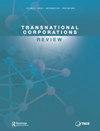How political risk in host country affects FDI: an explanation for the paradox of China’s investment risk preference
IF 1.6
Q3 BUSINESS
引用次数: 0
Abstract
In recent years, the scale of China’s outward foreign direct investment has been expanding, and the political risks are also intensifying. How does political risk affect the decision-making of outward foreign direct investment? This paper collected the relevant data of 134 countries from 2003 to 2016, using the regression method of System Generalised Method of Moments. It studies the political risk preference of outward foreign direct investment in the world and China. The study found that there is no political risk preference in the world as a whole. In contrast, China’s outward foreign direct investment has obvious political risk preference. China does not have a political risk preference for developed countries. At the same time, China has shown strong default risk preference for emerging market countries and countries along the "the Belt and Road". This study adds default risk when measuring political risk, and further subdivides political risk into five categories, taking into account their internal interaction mechanism. In addition, this paper not only studies the similarities and differences of outward foreign direct investment 's political risk preferences between China and the world, but also introduces investment motivation to better explain the location choice of China’s outward foreign direct investment.
东道国政治风险如何影响FDI:对中国投资风险偏好悖论的解释
近年来,中国对外直接投资规模不断扩大,政治风险也在加剧。政治风险如何影响对外直接投资决策?本文采用系统广义矩量法(System Generalised method of Moments)的回归方法,收集了2003 - 2016年134个国家的相关数据。研究了世界各国和中国对外直接投资的政治风险偏好。研究发现,全球整体上不存在政治风险偏好。相比之下,中国对外直接投资具有明显的政治风险偏好。中国对发达国家没有政治风险偏好。与此同时,中国对新兴市场国家和“一带一路”沿线国家表现出强烈的违约风险偏好。本研究在衡量政治风险时加入了违约风险,并进一步将政治风险细分为五类,并考虑到它们之间的内在互动机制。此外,本文不仅研究了中国与世界对外直接投资政治风险偏好的异同,还引入了投资动机,以更好地解释中国对外直接投资的区位选择。
本文章由计算机程序翻译,如有差异,请以英文原文为准。
求助全文
约1分钟内获得全文
求助全文

 求助内容:
求助内容: 应助结果提醒方式:
应助结果提醒方式:


